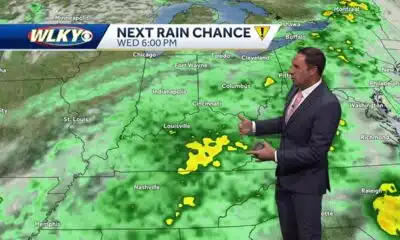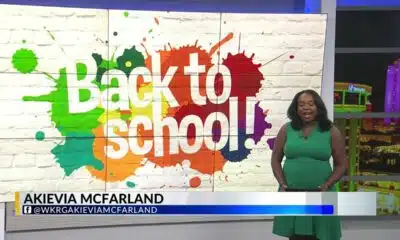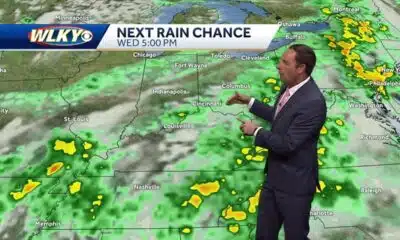News from the South - Texas News Feed
Rural Americans more likely to live with chronic pain
“Rural Americans more likely to live with chronic pain than urban peers, UT-Arlington study finds” was first published by The Texas Tribune, a nonprofit, nonpartisan media organization that informs Texans — and engages with them — about public policy, politics, government and statewide issues.
Subscribe to The Y’all — a weekly dispatch about the people, places and policies defining Texas, produced by Texas Tribune journalists living in communities across the state.
ODESSA — Rural Americans are likelier to develop chronic pain than their urban counterparts, a grim trend exacerbated by limited access to health care, age and economic status.
A study conducted by the University of Texas at Arlington, released last week, found that more than a third of people in rural areas experience increased pain or are nearing a chronic pain diagnosis. Residents in urban areas, meanwhile, aren’t as vulnerable to persistent, years-long pain and are likelier to experience no pain at all.
The peer-reviewed study was published in the Journal of Rural Health.
About 3 million Texans live in the state’s 200 rural counties. More people call rural Texas home than states such as Kansas, Mississippi and New Mexico.
As many as 100,000 rural Texans don’t have a primary care doctor, according to Texas 2036, an Austin-based think tank. Having a primary care doctor can help people identify chronic issues when they arise and make treatment options available.
“Due to health care shortages, limited access, and lower quality services, pain coping and management may be insufficient and less effective in rural areas, exacerbating the burden of pain,” the study’s authors wrote.
John Henderson, president and CEO of the Texas Organization of Rural and Community Hospitals, representing 157 hospitals in the state, was not surprised at the report’s conclusions.
Henderson said rural Texans often work physically demanding jobs where they are more prone to developing ailments, such as farming, ranching and oil field work. And in those areas, access to a healthcare facility or a primary care provider is limited. He said the distance to a hospital can take at least an hour, a drive many won’t make.
“If you’ve got to travel an hour to get the care you need in some of these poor, marginalized communities, they just don’t have a way to do that,” Henderson said.
The study relied on about 10,400 respondents, which the Centers for Disease Control and Prevention gathered in 2019. The respondents were asked to describe different thresholds of pain, from none at all to severe chronic pain. In 2020, the respondents were asked about how their pain progressed. The study sampled individuals from the age of 18 to those older than 65.
The 2025 findings exclude anyone who died, had missing contact information on the original study, was living under the care of a facility, or used someone else to communicate. Researchers used federal definitions of urban and rural, dividing them into four groups: from large metropolitan areas with more than a million residents to rural communities in towns with fewer than 5,000.
Chronic pain lasts at least three months, said Feinuo Sun, an assistant professor of kinesiology and the report’s lead author. Oftentimes, Sun said, it is associated with another disease, or a symptom of it. The study looks at chronic pain as a standalone and self-reported condition.
Between 2019 and 2020, most rural Americans’ pain either worsened or became chronic. More than a third of Americans aged 18-44 experienced an increase in pain. Nearly half of those in the 45 and older age group said the same. Men’s health in southern U.S. states between the ages of 45-64 had deteriorated the most, according to the study. Less than a third of Americans over 45 in rural areas recovered.
Urban residents reported a less pronounced progression of pain, while more of them recovered. People in rural areas “fare worse over one year compared to those in urban areas,” the report found.
The study’s methods were limited, the authors said. For instance, they relied on the pain the respondents reported without accounting for underlying causes, specific locations, or the duration of the pain. The authors also said the transition to severe pain could have been underestimated. The study did not sample as many racial and ethnic minorities, researchers added, noting that this made the findings for those groups less reliable.
Sun said the developing trend of pain in rural America results in people seeking prescribed opioids, or pain-relieving medications, which could lead to addiction and, at worst, death.
“Pain is consequential,” she said.
Disclosure: Texas 2036 and University of Texas – Arlington have been financial supporters of The Texas Tribune, a nonprofit, nonpartisan news organization that is funded in part by donations from members, foundations and corporate sponsors. Financial supporters play no role in the Tribune’s journalism. Find a complete list of them here.
Big news: 20 more speakers join the TribFest lineup! New additions include Margaret Spellings, former U.S. secretary of education and CEO of the Bipartisan Policy Center; Michael Curry, former presiding bishop and primate of The Episcopal Church; Beto O’Rourke, former U.S. Representative, D-El Paso; Joe Lonsdale, entrepreneur, founder and managing partner at 8VC; and Katie Phang, journalist and trial lawyer.
TribFest 2025 is presented by JPMorganChase.
This article originally appeared in The Texas Tribune at https://www.texastribune.org/2025/06/23/rural-america-texas-chronic-pain-ut-arlington/.
The Texas Tribune is a member-supported, nonpartisan newsroom informing and engaging Texans on state politics and policy. Learn more at texastribune.org.
The post Rural Americans more likely to live with chronic pain appeared first on feeds.texastribune.org
Note: The following A.I. based commentary is not part of the original article, reproduced above, but is offered in the hopes that it will promote greater media literacy and critical thinking, by making any potential bias more visible to the reader –Staff Editor.
Political Bias Rating: Centrist
This article presents a factual, data-driven report on chronic pain disparities between rural and urban Texans without adopting an ideological stance. It relies on scientific studies, expert commentary, and reputable sources, emphasizing healthcare access challenges without attributing blame or pushing a policy agenda. The language remains neutral, focusing on describing conditions and statistics rather than promoting particular political viewpoints or solutions. While it touches on socioeconomic and healthcare issues that can be politicized, the coverage itself maintains a balanced tone, consistent with centrist, objective journalism.
News from the South - Texas News Feed
DJ Campbell shifting into leadership role as the Longhorns' offensive line comes together
SUMMARY: Texas senior offensive lineman DJ Campbell approaches his final season determined to improve after feeling he left “food on his plate” last year. With 30 starts and 37 games played, Campbell is the most experienced Longhorn lineman and emerging as a vocal leader for a young offensive line. Head coach Steve Sarkisian and offensive line coach Kyle Flood are rebuilding the unit, with Campbell the only returning starter at his position. Despite a season-ending injury to a teammate, Campbell praises sophomore Brandon Baker’s effort and Flood’s teaching, emphasizing learning and readiness for when players step into key roles.
The post DJ Campbell shifting into leadership role as the Longhorns' offensive line comes together appeared first on www.kxan.com
News from the South - Texas News Feed
Tropical update: Tracking two disturbances for possible development
SUMMARY: Tropical waves in the Atlantic basin are being closely monitored this week. One wave near the coast of Africa has a 50% chance of developing over the next seven days, while another in the central Atlantic has about a 20% chance and may fizzle out. A possible secondary wave could form near Africa as well. This pattern aligns with typical Atlantic hurricane season trends, which are quiet in June and July, peak around September 10th, and decline through October. Both the Euro and GFS models currently keep these disturbances north of the Caribbean, but rain chances and isolated storms will continue into next week.
Invest AL96 and AL97 are churning in the Atlantic as the peak of hurricane season approaches.
News from the South - Texas News Feed
Texas migrant detention center to be largest in US
SUMMARY: The U.S. military is constructing Camp East Montana at Fort Bliss in El Paso, Texas, which will be the largest federal migrant detention center in U.S. history. Initially housing 1,000 migrants awaiting deportation, it will expand to 5,000 beds. The Army has spent $232 million so far, with a $1.24 billion contract awarded to Acquisition Logistics for the facility. Earlier plans to detain migrants at Guantanamo Bay were halted due to unmet ICE housing standards. Currently, 33 high-threat and eight low-threat migrants remain at Guantanamo. The White House has not commented on the tent infrastructure status.
The Fort Bliss, El Paso, center will be the largest in US history.
Subscribe to FOX 4: https://www.youtube.com/fox4news?sub_confirmation=1
Dallas news, weather, sports and traffic from KDFW FOX 4, serving Dallas-Fort Worth, North Texas and the state of Texas.
Download the FOX LOCAL app: fox4news.com/foxlocal
Watch FOX 4 Live: https://www.fox4news.com/live
Download the FOX 4 News App: https://www.fox4news.com/apps
Download the FOX 4 WAPP: https://www.fox4news.com/apps
Follow FOX 4 on Facebook: https://www.facebook.com/Fox4DFW/
Follow FOX 4 on Twitter: https://twitter.com/FOX4
Follow FOX 4 on Instagram: https://www.instagram.com/fox4news/
Subscribe to the FOX 4 newsletter: https://www.fox4news.com/newsletters
-
Mississippi Today7 days ago
After 30 years in prison, Mississippi woman dies from cancer she says was preventable
-
News from the South - Texas News Feed7 days ago
Texas redistricting: What to know about Dems’ quorum break
-
News from the South - North Carolina News Feed5 days ago
Two people unaccounted for in Spring Lake after flash flooding
-
Mississippi Today6 days ago
Brain drain: Mother understands her daughters’ decisions to leave Mississippi
-
News from the South - Georgia News Feed6 days ago
29-year-old killed after driving off road in 'dangerous' section road | FOX 5 News
-
News from the South - Louisiana News Feed7 days ago
Plans for Northside library up for first vote – The Current
-
Local News Video7 days ago
Sparklight offers free backpacks and school supplies to Coast kids
-
News from the South - North Carolina News Feed7 days ago
Moore County, NC, a month after Chantal damage








































